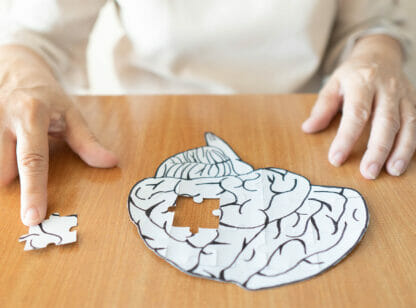Throughout most of the twentieth century, neuroscientists believed that the brain was a static organ which reached its potential for establishing new pathways during early childhood. With advances in science, this theory has changed. ‘Neuroplasticity’ refers to the brain’s ability to form new pathways throughout life in response to changes in behavior and the environment.
Neuroplasticity has long been associated with the neural connections formed during normal growth and development, such as in learning a new skill or storing information to memory. It is also the process that explains recovery of function following stroke and brain injury. Although the concept of neuroplasticity is widely accepted, stroke and brain injury survivors are often told by physicians and other health care providers that functional skills such as walking and talking will improve for up to one year following the injury. It is true that more rapid recovery usually occurs within the first six months, which can be attributed to reduced brain swelling and healing of the tissue surrounding the area of injury. However, physical, occupational, and speech/language therapists who treat these patients can attest that improvements, which evolve more slowly, can continue to be documented years after the initial injury.
The ability of the brain to change and adapt following neurological injury is an active process that must incorporate three basic treatment principles. Treatment must provide multiple repetitions of the task; the task must be specific to the desired function; and the task must be progressively more complex. The following serves as an example of this concept:
Three seven year-old girls are proficient at riding two-wheeled bikes with training wheels. When they are ready to graduate to standard two-wheeled bicycles, the fathers of the girls approach their training in three different ways: The first girl rides a stationary bicycle every day for 30 minutes for two weeks. The second girl rides the bike without training wheels three days per week for 30 minutes for two weeks. The third girl rides the bike without training wheels every day for 30 minutes for one week. After mastering this skill, she practices riding the larger bicycle every day for one week. After two weeks, only the third girl is able to ride a standard bicycle. In the first case, training was not specific to the task. In the second case, training did not include enough practice and the task was not specific. The third girl was successful because her training was not only task specific and provided adequate practice, but also increased in complexity as she transitioned from the smaller to larger bicycle.
The discovery that neuroplasticity occurs throughout life and that the brain has the ability to establish new neural connections following stroke and brain injury brings renewed hope for recovery of lost function. However, neuroplasticity is driven by repetition, task specificity, and complexity and therefore, the survivor must commit to intensive and challenging practice of the desired functional goal. This is vastly different from more “traditional” therapeutic approaches in which the exercises or activities are not linked to a functional task. The brain is not wired to translate isolated exercise, such as strengthening for the biceps or quadriceps, into the activity required to pick up an object or to walk. However, it is wired to respond to tasks that are meaningful. The more motivated the survivor is to practice the task, the more potential there is for establishing new neural connections and therefore, for recovery of function.
Gina Malloy is a physical therapist with New Beginning Physical Therapy, Inc., an in-home therapy company. She has advanced certifications in treating people with neurological issues, especially stroke and brain injuries. Gina can be reached at 760-218-9961 or online at NewBeginningPT.com.











































Comments (2)
hello I would like to know what Gina MALLOY CAN DO TO HELP ME AFTER HAVING A REALLY BAD STROKE LAST YEAR 2014
Please give me a call at 760-218-9961. We can discuss what your challenges are and I can provide some guidance and resources, as well as share what New Beginning PT has to offer. Please know that you can keep improving!